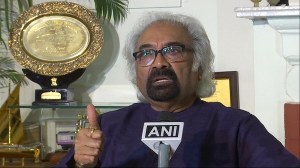- India
- International
Can Americans count on a peaceful transition of political power?
The fears about the possibility of a peaceful presidential transition point towards a crisis of liberal democracy that has uniquely American characteristics.
![President Donald Trump speaks during a campaign rally at Pensacola International Airport, Friday. [AP]](https://images.indianexpress.com/2020/10/Sanjib-Baruah.jpg?w=640) President Donald Trump speaks during a campaign rally at Pensacola International Airport, Friday. [AP]
President Donald Trump speaks during a campaign rally at Pensacola International Airport, Friday. [AP]There was a time when the United States was regarded as one of the world’s most stable democracies. It has one of the world’s oldest modern constitutions, which was drafted in 1787, ratified in 1788, and has been in effect since 1789. This political order has survived numerous challenges, including a four-year long Civil War (1861-1865) when the 11 slave-owning southern states broke away to form the confederacy. However, this challenge to the Constitution serves as a reminder that this economically and politically powerful democracy has not always been a liberal one. The US, as political theorist Judith Shklar liked to point out, “was not a liberal state until after the Civil War”, and even then, for a long period “often in name only”.
The peaceful transition of political power is only a bare minimum threshold for a stable democracy. Yet, whether this would happen in the US after this election is today in doubt to a degree that is unprecedented in living memory. In some of the most influential quarters of American life, there is great concern about the prospects of an orderly presidential transition. The New York Times has even published the “nightmare scenarios” of seven election experts — their fears about the worst thing that could happen with the elections — and possible measures to prevent it.
When Donald Trump won his unlikely election victory four years ago, the talk was of a populist challenge to liberal democracy. Concerns about the rise of populist demagogic politics in various parts of the world were then based on parallels with the politics of Europe in the 1930s, which seemed overblown to many.
But the fears about the possibility of a peaceful presidential transition point towards a crisis of liberal democracy that has uniquely American characteristics. The efforts by Trump and his allies to undermine the integrity of the election system — through often-repeated but unsubstantiated concerns about voter fraud and misinformation about the credibility of postal ballots — creates conditions for Trump’s supporters to reject the election results. In addition, the talk of voter fraud provides cover to controversial local-level decisions on polling locations and postal ballot requirements that could lower voter turnout among groups that disproportionately support Democrats.

Postal ballots will most likely account for more than half the votes in the coming elections. But since Trump has successfully politicised the COVID-19 precaution protocols, many more Biden supporters will vote by post than Trump supporters. As a result, the results available on the night of the elections on November 3 — based on the counting of only in-person ballots — are likely to be substantially different from the final count. All this could lead to significant uncertainty, legal battles, public protests and mayhem, plunging the country into a post-election crisis.
This threat became menacing when the moderator of the first presidential debate asked Trump if he would encourage his supporters to stay calm during what could be an extended ballot counting period. Trump said in response that he would urge his “supporters to go into the polls and watch very carefully”, which could easily be interpreted as a call for voter intimidation.
Trump’s war on the democratic process has had a significant impact on the present election cycle. Consider former President Barack Obama’s keynote address to the Democratic national convention. The symbolism of the visual setting he chose for his recorded video speech is quite telling. He spoke standing in front of a display about the drafting of the US Constitution outside the Museum of the American Revolution in Philadelphia, the city where the US Constitution was drafted and signed.
Opinion | C Raja Mohan writes: Incentives to advance India-US partnership are stronger than ever before
It was anything but a conventional party convention speech, trying to rally loyalists behind the party’s candidates. Quite astonishingly, Obama appealed to Democrats to get behind Joe Biden and Kamala Harris in order to defend democracy. He had hoped that Trump might “discover some reverence for the democracy that had been placed in his care. But he never did”. Pointing to a few standard democratic principles that are usually noncontroversial, Obama said, “this president and those who enable him, have shown they don’t believe in these things”. Biden and Harris should be supported because they believe that the right to vote is sacred in a democracy and that “we should be making it easier for people to cast their ballots, not harder”. Unlike Trump, they believe that “no one, including the president, is above the law”, they don’t think their political opponents are “un-American”; or that the free press is the “enemy”. And then came Obama’s clincher: “That’s how a democracy withers, until it’s no democracy at all.”
What makes American democracy particularly vulnerable to the Trump challenge is the peculiar way in which it elects its president. Presidential elections are determined not by the national popular vote, but by the votes of individual states reflected in the Electoral College. Donald Trump became president in 2016 even though nationally Hillary Clinton won 2.9 million more votes than him (2.1 per cent of the total votes). But Trump won 304 Electoral College votes to Hillary Clinton’s 227.
The Electoral College gives states with small populations such as Vermont, Alaska, Montana and Wyoming a disproportionate voice in choosing the president. They enjoy the same advantage in the Senate, the country’s most powerful legislative body: Wyoming (population: 0.6 million) and California (population: 39.5 million) both have two Senators.
The Harvard historian Alexander Keyssar, author of the new book Why Do We Still Have the Electoral College, tells us that historically the institution can only be understood as a legacy of “slavery and white supremacy”. There have been more amendments proposed to change the Electoral College than on any other subject. But the US Constitution is notoriously difficult to amend; there have been only 17 constitutional amendments in the last 230 years. For most of its history, says Keyssar, the efforts to reform or abolish the Electoral College have been stymied “by Southern politicians in the interest of maintaining white supremacy”.
This article first appeared in the print edition on October 28, 2020 under the title “The Trump challenge”. The writer is professor of political studies at Bard College, New York
Also read from Explained | Why the US election 2020 matters to India
EXPRESS OPINION
More Explained
Apr 24: Latest News
- 01
- 02
- 03
- 04
- 05










































